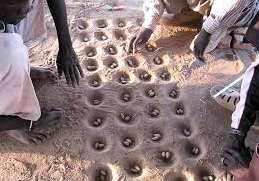Kiela is a mancala game played by Kimbundu speaking people in northern Angola near Grandos Lagos and Alto Zambeze. The name of the game means "puzzle" or "mindsport"
The game plays an important role in the oral literature and it is said to be a game of peace because"it can turn enemies into friends".
The "Instituto Nacional do Património Cultural" reports that the first official tournament was held in 1989 by the SIAC/Fenacult. Later in 1999, the government of Angola instituted the "Prémio Kiela", a tournament which has offered prizes up to 1,500 US$ for the winner. In the early 2000s, the game was supported by the Angolan Ministry of Culture and the province governor Aníbal Rocha.
In 1991, Bernardo Francisco Campos developed the first Kiela software and registered it with the Directorate of Spectacles Property Rights, in Lisbon. Later in 2001, Campos founded an Angolan organization called "Associação para a Promoção do Kiela (Aprokiela)" with the objective to promote Kiela and other cultural values. Campos also trademarked the game in 18 countries, among them South Africa, the European Union, and the USA.
Playing Rules
Kiela is played on a board made by four rows of ten holes. Each player controls the two rows on his side of the board.
The initial position depends on the experience and strength of the players:
▪ Beginners start with one seed in each hole of the outer rows and one stone in each of the four right holes of each player's inner row.
Initial Position for Beginners
▪ Advanced players start with two seeds per hole in the same holes as described above.
Initial Position for Advanced Players
▪ Expert players may, at their first turn, rearrange the stones on their side.
Possible Position after Expert Play
At his turn a player takes the contents of one of his holes, which contains two or more seeds, and sows them one by one anti-clockwise into the succeeding holes of his board side.
If the last stone lands in an empty hole, the turn ends.
If the last stone lands in an occupied hole all these stones (the one just landed plus the ones that were already there) are picked up and sown in another lap.
▪ If this occupied hole is in the inner row and the opposite hole of the opponent is occupied, the stones of this hole are captured and the player keeps on sowing with them starting in the hole following the one that allowed him to capture.
▪ If the outer hole of the opponent is also occupied, the player captures also its stones, and then sows the stones of both opponent's holes.
When a player cannot move (i.e., all his holes are empty or contain single stones), he has lost. (From Mancala.wikia.com)




